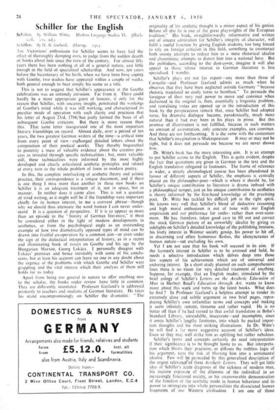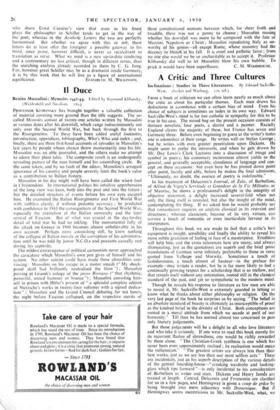Schiller for the English
Schiller. By William Witte. Modern Language Studies VI. (Black- well. i 2S. 6d.) Schiller. By H. B. Garland. (Harra!). I cs.) THE Victorians' enthusiasm for Schiller seems to have had the effect of thoroughly damping ours, to judge from the sudden dearth of books about him since the turn of the century. For almost fifty years there has been nothing at all of a general nature, and little enough in the field of specialised scholarship. And now, ten years before the bicentenary of his birth, when we have been busy coping with Goethe, two studies have appeared within a couple of weeks. both general enough to bear simply his name as a title.
This is not to suggest that Schiller's appearance at the Goethe celebrations was an untimely intrusion. Far from it. There could hardly be a more appropriate guest of honour, if only for the reason that Schiller, with uncanny insight, penetrated the workings of Goethe's mind while it was still working, and characterised its peculiar mode of operation with such clarity and precision that his letter of August 23rd, 1794;Nhas justly formed the basis of all subsequent Goethe criticism. But there is more reason than this. That same letter inaugurated one of the most important literary friendships on record. Almost daily, over a period of ten years, the two greatest German writers of the time—a critical time from every point of view—exchanged detailed letters about the composition of their poetical works. They thereby bequeathed to posterity a mass of valuable evidence about the creative pro- cess as revealed through specific technicalities ; but, more valuable still, these technicalities were informed by the most highly developed and clearly articulated aesthetic principles and related at every turn to the whole problem of form in modern poetry.
In this, the complete interlocking of aesthetic theory and artistic practice, their correspondence is a unique document, and if there is one thing I miss more than another in these new books on Schiller it is an adequate treatment of it, not in space, but in manner. In neither does it come alive. This is not a question of vivid writing, as it might well be if the friendship were important chiefly for its human interest, to Cue a currrent phrase—though why we should thus attenuate the word human I can never under- stand. It is a question of perspective. If it is to appear as more than an episode in the " history of German literature," it must be considered either in the light of modern developments in aesthetics, or from the psychological angle as an outstanding example of how two diametrically opposed types of mind can be drawn into fruitful co-operation by a common aim—or even under the sign of the dialectical interpretation of history, as in a recent and illuminating book of essays on Goethe and his age by the Hungarian Marxist, Georg Lukacs. I personally disagree with Lukacs' premises and hence inevitably with some of his conclu- sions, but at least his account can leave no one in any doubt about the urgency of the problems with which Goethe and Schiller were grappling and the vital interest which their analysis of them still holds for us today.
Apart from being too general in nature to offer anything new to the scholar, the books under review have little in common. They are differently orientated. Professor Garland's is addressed primarily to teachers and students of German literature. He takes his stand uncompromisingly on Schiller the dramatist: "The
originality of his aesthetic thought is a minor aspect of his genius. Before all else he is one of the great playwrights of the European tradition." His book, straightforwardly informative and written out of sincere admiration for Schiller's integrity of character, will fulfil a useful function by giving English students, too long forced to rely on foreign criticism in this field, something to counteract both snooty attempts to reduce him to a mere rhetorical idealist and chauvinistic attempts to distort him into a national hero. But the publishers, according to the dust-cover, imagine it will also appeal to those whose interest in German literature is less specialised. I wonder.
Schiller's plays are not for export—any more than those of Corneille—and Professor Garland admits as much when he observes that they have been neglected outside Germany " because rhetoric translated so easily turns to bombast." To persuade the foreigner of their very real power to move and convince when declaimed in the original is, then, essentially a linguistic problem, and tantalising vistas are opened up in the introduction of this book by the perspicacious remark that, once Schiller had adopted verse, his dramatic dialogue became, paradoxically, much more natural than it had ever been in his plays in prose. But this promise of illumination is not fulfilled, because in such matters no amount of asseveration, only concrete examples, can convince. And these are not forthcoming. It is the same with the contention
that Schiller's imagination is Shakespearean It may or may not be right, but it does not persuade me because we are never shown how.
Dr. Witte's book has the more interesting aim. It is an attempt to put Schiller across to the English. This is quite evident, despite the fact that quotations are given in German in the text and the English translation relegated to footnotes. The frame of reference is wider, a strictly chronological course has been abandoned in favour of different aspects of Schiller, the emphasis is centrally placed on the philosopher-poet—which is where it should be, for Schiller's unique contribution to literature is drama imbued with a philosophical temper, just as his unique contribution to aesthetics is theory informed by the first-hand knowledge of the practising poet. Dr. Witte has tackled his difficult job in the right spirit. He knows very well that Schiller's blend of deductive reasoning and high moral enthusiasm is out of tune with our English empiricism and our preference for under- rather than over-state- ment. He has, therefore, taken good care to fill out and correct the stock German picture of an unworldly idealist by giving us sidelights on Schiller's detailed knowledge of the publishing business, his lively interest in Weimar society gossip, his power to hit off, in discerning and often humorous flashes, the idiosyncrasies of human nature—not excluding his own.
Yet I am not sure that his book will succeed in its aim. If the layman's interest in Schiller is to be aroused and held, he needs a selective introduction which delves deep into those few aspects of his achievement which are of universal and enduring interest. In a short study planned on such comprehensive lines there is no -1-tiom for very detailed treatment of anything. Suppose, for example, that an English reader, stimulated by the brief eulogy of Schiller's Letters on the Aesthetic Education of Man in Herbert Read's Education through Art, wants to know more about this work and turns up the latest books. What does he find ? In Professor Garland's a helpless attempt to render its extremely close and subtle argument in two brief pages, repro- ducing Schiller's own unfamiliar terms and concepts and making it seem infinitely remote, tiresome and rather vapid. He is no better off than if he had turned to that awful translation in Bohn's Standard Library, unreadable, inaccurate—and incomplete, since it omits Schiller's lengthy footnotes, into which he packed impor- tant thoughts and his most striking illustrations. In Dr. Witte's he will find a far more suggestive account of Schiller's ideas. Even so they may well strike him as uplifting but rather nebulous.
Schiller's terms and concepts certainly do need interpretation if their significance is to be brought home to us. But interpreta- tion which blunts their precision, or diffuses the ruthless logic of his argument, runs the risk of blurring him into a sentimental idealist. Few will be persuaded by this generalised description of the urgent relevagerof these Aesthetic Letters. They will get little idea of Schiller's acute diagnosis of the sickness of modern man, his incisive exposure of the dilemma of the individual in an increasingly functional society, or his unanswerable demonstration of the function of the aesthetic mode in human behaviour and its power to reintegrate into whole personalities the dissociated human fragments of our Western civilisation. I am one of those
who share Ernst Cassirer's view that even in his finest plays the philosopher in Schiller tends to get in the way of the poet, whereas in the Aesthetic Letters the two are perfectly harmonised. But whether we agree with this or not, these letters do at least offer the foreigner a possible gateway to his mind, since prose, however difficult, is never so recalcitrant to translation as verse. What we need is a new up-to-date rendering and a commentary no less critical, though in different terms, than the searching analysis already accorded to them by C. G. Jung. For, however great Schiller may be as a dramatist inside Germany, it is by this work that he will live as a figure of international







































 Previous page
Previous page